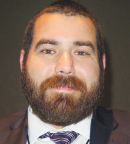The anabolic hormone testosterone may lessen the early adverse cardiovascular effects of chemotherapy and chemoradiation for advanced or recurrent cancer, according to a randomized controlled trial reported at the 9th International Conference on Head and Neck Cancer.1
Among the patients studied, all of whom had head and neck or cervical cancer, 7 weeks of concurrent testosterone therapy during cancer treatment yielded more favorable changes than placebo in outcomes such as ejection fraction (+6.2% vs –1.8%) and cardiac index (+27.6% vs +2.8%). And the drug appeared safe and well tolerated, with no reported side effects, even in women.

Albert Chamberlain, MD
“Adjunct testosterone therapy may provide an avenue for reducing cardiac stress to ensure the heart’s reserves are not tested in a time of substantial myocardial or myocyte stress and injury. Mitigation of this cardiac stress may lead to decreased dysfunction and a decreased incidence of chemotherapy-induced remodeling,” proposed first author Albert Chamberlain, MD, Research Fellow, Division of Endocrinology and Metabolism, Department of Internal Medicine, University of Texas Medical Branch, Galveston.
“Testosterone therapy may also have prehabilitation implications and might make patients better surgical candidates, besides the potential benefit of reducing complications due to patient deconditioning,” he added.
Study Details

Melinda Sheffield-Moore, PhD
This clinical trial, which was funded by the National Cancer Institute, was undertaken by principal investigator Melinda Sheffield-Moore, PhD, to assess the impact of testosterone on body composition, in an attempt to prevent or mitigate the cachexia associated with advanced cancer and its treatment, Dr. Chamberlain explained. Dr. Sheffield-Moore is Professor in the Division of Endocrinology at the University of Texas Medical Branch in Galveston.
However, Dr. Chamberlain said “one of the known effects of testosterone is that it can cause vasodilation in both large and resistance arteries. And with that in mind, we decided to monitor how these hemodynamic changes might alter cardiac function and performance.”
The 16 patients studied had recently diagnosed advanced (stage IIIB or IV) or recurrent head and neck or cervical cancer and were scheduled to receive standard-of-care chemotherapy or chemoradiation. They were randomized to receive weekly intramuscular injections of either 100 mg of testosterone or placebo for 7 weeks while undergoing therapy. Cardiac function was assessed before and after therapy with two-dimensional and Doppler echocardiograms.
Cardiac Findings
Results showed no significant difference between groups in the change in end-systolic or end-diastolic volumes, Dr. Chamberlain reported. There was a trend, however, for the testosterone group’s end-systolic volume to be decreased and end-diastolic volume to be increased at the end of the study. Subsequently, stroke volume increased by 18.2% in the testosterone group while the placebo group decreased by 2.6% (P = .01). Similarly, ejection fraction fell by 1.8% with placebo but rose by 6.2% with testosterone (P = .02). The cardiac index increased in both groups; however, the gain was 2.8% with placebo, compared with 27.6% with testosterone (P = .02).
The groups did not differ significantly with respect to changes in the ratio of early transmitral flow velocity to early diastolic velocity of the mitral valve annulus, the E/e’ ratio, which is inversely related to vascular compliance. The ratio rose in the placebo group but fell in the testosterone group. “The takeaway [here] is that testosterone doesn’t have any negative impact on diastolic function,” Dr. Chamberlain explained.
Testosterone Therapy and Cardiac Function
- In a randomized trial of 16 patients with advanced or recurrent head and neck or cervical cancer receiving chemotherapy/chemoradiation, testosterone led to more favorable changes in ejection fraction (+6.2% vs –1.8%) and cardiac index (+27.6% vs +2.8%) compared with placebo.
- The 7 weeks of testosterone therapy was well tolerated and not associated with any side effects.
Finally, systemic vascular resistance increased by 3.9% with placebo but decreased by 26.5% with testosterone
(P = .001).
“The reduction in afterload caused by testosterone seems to be the driving force behind the systolic improvements. We can’t rule out an increase in contractility as a potential contributing factor,” he summarized. “End-diastolic volume remained unchanged in both groups, and that suggests preload is unlikely to be the mechanism for the increase in the stroke volume.”
None of the patients who received testosterone experienced side effects. A single patient in the placebo group had a stroke.
Impact on Oncologic Outcomes
The impact of testosterone therapy on oncologic outcomes is unknown, Dr. Chamberlain acknowledged. But emerging data, including some from Massachusetts General Hospital in men with prostate cancer, suggest it may be safer than previously thought.
“Further investigation is warranted to establish the degree of benefit, if any, that adjunct testosterone may provide to late-stage cancer patients undergoing chemotherapy with agents of known high cardiotoxic risk,” he concluded. ■
Disclosure: Drs. Chamberlain and Sheffield-Moore reported no potential conflicts of interest.
Reference


